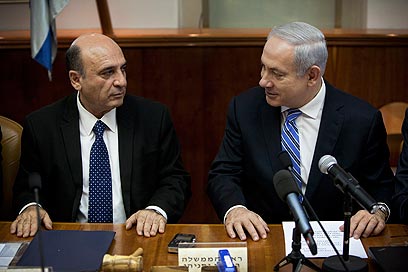Attila Somfalvi
|
|
In practice, the bill means that military rule will not be applied in settlements. Imposing Israeli law on Jewish settlements is de facto annexation of the West Bank.
Proposed by MK Miri Regev, the bill was brought to a vote at the Ministerial Committee – a prelude to a Knesset vote.
Five ministers initially voted in favor, including Likud ministers Gideon Sa'ar and Limor Livnat. Minister Benny Begin protested and said, "The government is being forced into a decision which must be left to a specially-designated cabinet meeting."

Netanyahu and new coalition partner Shaul Mofaz at cabinet meeting (Photo: AP)
Justice Minister Yaakov Ne'eman, who chairs the Ministerial Committee, wished to postpone the vote by 15 minutes to consult with the prime minister. Upon his return he said, "I wish to postpone the vote by a month and coordinate the matter with the government and the prime minister. This is a political bill and cannot be passed without such coordination."
Minister Dan Meridor joined Ne'eman and said, "Such a vote cannot be brought 'out of the blue' without a serious discussion."
Chairman of the Habayit Hayehudi party, Minister Daniel Hershkowitz also endorsed the suggestion.
After the ministers realized that Netanyahu wants to postpone the vote and take it off the agenda, nine of them opposed the bill, including Sa'ar and Livnat who said they had originally thought they were voting for a delay in the vote. Five abstained and one – Stas Misezhnikov - voted in favor.
During the meeting, the Deputy Attorney General Orit Koren said, "The dominant nature of the bill is political and limits the options at the government's disposal. The meaning is virtually full annexation. There is no legal impediment to do this but one needs to understand the consequences."
Aviad Glickman contributed to this report
No comments:
Post a Comment